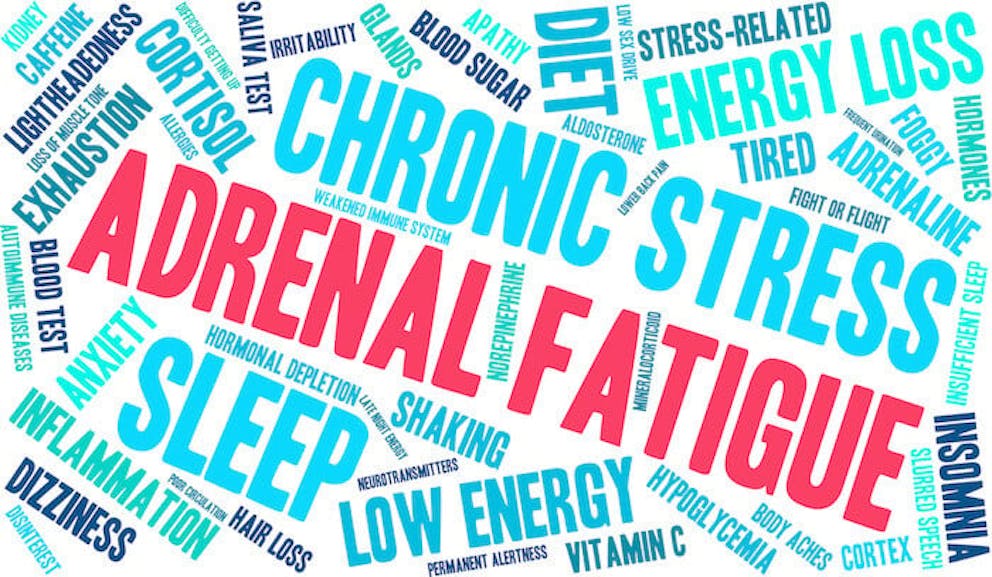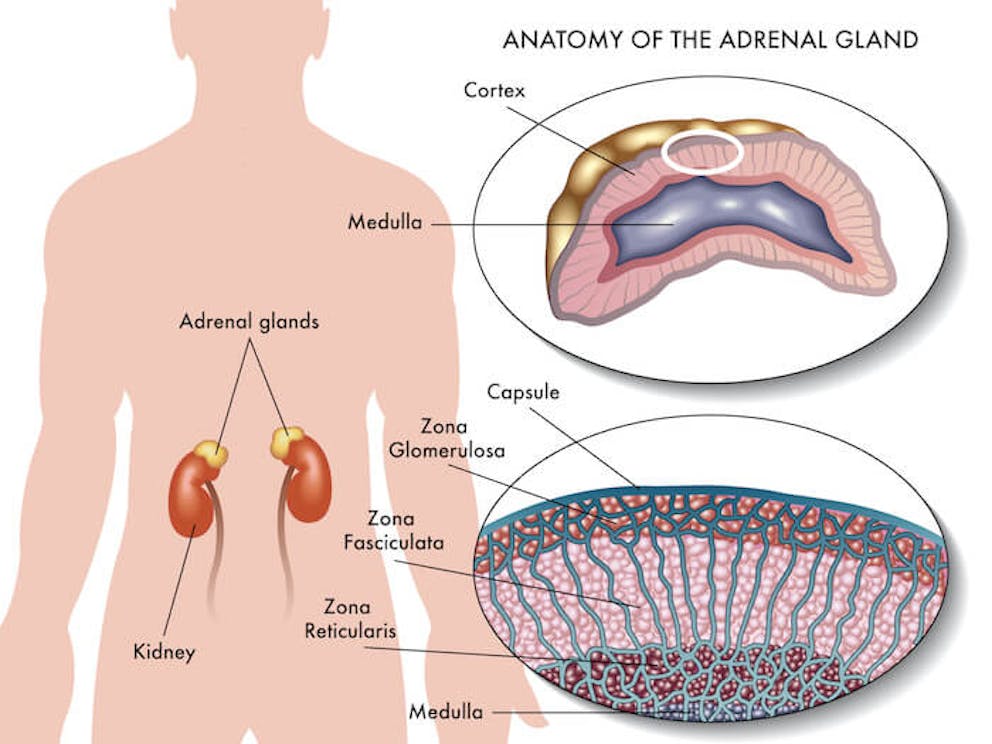Will Adrenal Fatigue Cause Weight Gain
In this article, let's talk about adrenal fatigue and answer the question, "will adrenal fatigue cause weight gain?" We also need to understand why it is that adrenal fatigue has an influence on your weight—I'll explain this in a moment.
The first thing you need to know is that the medical profession does not acknowledge adrenal fatigue as a medical problem—they don't recognize it at all!
This is interesting because there's a condition called Cushing's syndrome, which is characterized by high cortisol or hypercortisolism. As you may already know, cortisol is known as the stress hormone, and the adrenal glands are responsible for creating it.
The thing is, you don't just wake up with this Cushing's. It gradually starts and gets worse it worse. What I’m saying is that adrenal fatigue has the potential to turn into something worse—the same way that prediabetes happens before type II diabetes.
Adrenal fatigue is a big problem, and we're going to talk more about why it is, and how it could lead to weight gain.
In this article, I will cover:

What Are the Adrenals?
The adrenals, also known as the suprarenal glands, are two glands that sit on top of your kidneys. They are considered endocrine glands, which means that they are responsible for producing hormones.
This includes hormones like adrenaline, aldosterone, and—you guessed it—cortisol.
Each adrenal gland has two parts—an outer cortex (this part produces steroid hormones) and an inner medulla (this part is responsible for creating androgens, or male sex hormones).
What is Adrenal Fatigue?
Adrenal fatigue is where your adrenal glands are overworked and begin producing too much cortisol. Keep in mind that, as we talked about earlier, medical professionals do not consider adrenal fatigue a medical problem. They don't even recognize it as a legitimate health concern.
They do, however, consider Cushing's syndrome a problem. Cushing's syndrome is a situation where you have way too much cortisol, also known as hypercortisolism. I think that it's interesting that they consider Cushing's syndrome a problem, but they don’t consider adrenal fatigue a real problem.
Just as prediabetes is a problem that leads up to type II diabetes, adrenal fatigue may have the potential to be a precursor to Cushing's.
As we all know, prediabetes is absolutely a problem that has to be addressed—preferably with Healthy Keto and intermittent fasting.
Just like with diabetes, you don't just one day wake up with Cushing's. Instead, it comes on gradually over time. In the same way, I think it's best to address the signs of adrenal fatigue before they turn into something bigger—just like how you should address Fat Storing Hormone resistance and prediabetes before they become larger issues.

Signs and Symptoms of Adrenal Fatigue
How do you know if you might have a problem with adrenal fatigue? Well, there's no way to know for sure without having your cortisol levels checked. However, Cushing's syndrome does have some typical signs and symptoms you can look out for.
These signs and symptoms include:
Visceral fat
High blood pressure
Round face
Red cheeks
Fatigue
Anxiety
Buffalo hump
Fat-collar bone
Thin skin
Decreased libido
Hypokalemia
Low vitamin D
Insomnia
People with adrenal fatigue can also experience these symptoms, but they may not be quite as severe.
Will Adrenal Fatigue Cause Weight Gain?
Let's get back to the question, "will adrenal fatigue cause weight gain?" The answer really depends on how chronic it is.
If you have an issue with chronic stress, as opposed to only having occasional stress events, then you can definitely have some weight gain. It also depends on the diet. If you have a bad diet and you have chronic stress, the situation is going to be far worse. Your adrenal body type will be a primary factor in determining where your body will hold fat deposits. There are three major adrenal body types that we discuss in greater detail through our YouTube channel and blog and this quiz on body types is an excellent source of additional information.
How Could Adrenal Fatigue Cause Weight Gain?
How does cortisol cause weight gain, exactly? Well, the purpose of cortisol is to increase your energy in stressful situations, like being chased by a tiger. However, there's a little bit of a "hiccup" in our body's programming caused by the modern lifestyle.
When energy (which is sugar in this case) isn't being used—like in situations where you work at a desk for most of the day—it gets stored as fat.
Even worse, cortisol converts your muscle into sugar, which can reduce your muscle mass.
So instead of high levels of cortisol being put to good use in extremely dangerous situations, it ends up just leading to excessive weight gain and many other chronic issues.
To add to the problem, cortisol also has yet another function. Along with creating fat, it prevents the burning of fat. This means that you'll have a hard time getting into ketosis! So if you're on a ketogenic diet, you could have a far more difficult time trying to get into ketosis and stay there.

How to Fix Adrenal Fatigue and Weight Gain
Adrenal fatigue almost always comes from stress events and chronic every-day stressors. The key is to start by figuring out where the stress is coming from. Then, you can work towards lowering it.
Stress can be caused by things like certain situations at work, relationship troubles, and money issues. Of course, these are not things you can fully control. However, you can change your attitude towards these events and try practicing meditation to relieve stress and anxiety.
Going on walks is one of the best things you can do to relieve stress. Not only will it helps with having a calm mind, it's also fantastic for physical stress—like muscle tension that you've been holding at your desk for 8-12 hours a day.
The next thing you should do is to start on Healthy Keto and intermittent fasting. These will help get your body into a healthier state. If your diet is poor, your body is not going to be happy with you. To add to it, many people get stressed about gaining weight, which causes even more weight gain. Help stop the cycle with Healthy Keto and intermittent fasting.
The next thing you should do is to start on Healthy Keto and intermittent fasting. These will help get your body into a healthier state. If your diet is poor, your body is not going to be happy with you. To add to it, many people get stressed about gaining weight, which causes even more weight gain. Help stop the cycle with Healthy Keto and intermittent fasting.
Finally, make sure you are getting plenty of nutrients. Don't forget that on any diet, you need to have plenty of vitamins, minerals, trace minerals, and electrolytes. Most of all, make sure you're getting plenty of vitamin D, vitamin C, and potassium. These are vital for improving a stress state.
Key takeaways
Your adrenal glands have a massive effect on your body. They have a role in both physical and mental health. When you have chronic stress, your adrenal glands may produce excess amounts of cortisol, also known as hypercortisolism. If you continue with a situation of high cortisol, it may develop into an even more severe problem.
Adrenal faftigue can cause weight gain in certain situations—particularly when the stress and high cortisol levels are chronic.
You can help combat high cortisol by:
Doing Healthy Keto and intermittent fasting
Getting plenty of nutrients—especially vitamin D, vitamin C, and potassium
I hope this helps clear up the question, "will adrenal fatigue cause weight gain?" If you suspect that you have an adrenal fatigue situation, give these tips a try and see if they work for you.
Up Next:-
Disclaimer: Our educational content is not meant or intended for medical advice or treatment.
Editor’s Note: This post has been updated for quality and relevancy.
Previous blog
Make Your Immune System Bulletproof NowNext blog
Best Remedies for RheumatoidTags

Popular
08/21/2024
55.7K views
02/23/2025
46.8K views
11/18/2024
281.2K views
03/18/2024
11/21/2022




